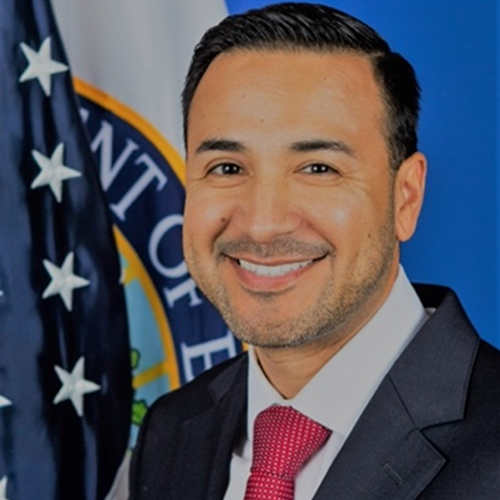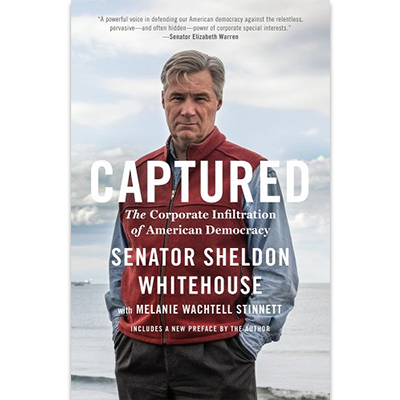Fellows Spotlight

John Garcia III
(Washington, D.C., 2012)
Senior Advisor
United States Department of Education
1. Can you please describe your work and how public policy impacts how you manage your organization?
I’m currently a senior advisor in the Office of Policy, Evaluation and Planning at the U.S. Department of Education in Washington, D.C. In my office, we ensure alignment across the department with the secretary’s priorities, using evidence-based approaches to inform the budget, regulations, and grants design, among other items.
My work is primarily focused on strengthening pathways from K-12 to postsecondary and in-demand careers as part of the Unlocking Career Success Initiative, in partnership with the Department of Commerce and Department of Labor. I also work on postsecondary completion, the College Scorecard and Community College Success as part of my portfolio. This work is incredibly important to the Biden-Harris administration as we work to transform our economy through implementation of the Bipartisan Infrastructure Law, CHIPs and the Inflation Reduction Act. A core part of that work will require preparing the future workforce by strengthening education to workforce pathways that lead to high-quality jobs, inclusive regional economic development, improved global competitiveness and stronger national security.
I believe public policy will have a profound impact on how we shape the world for future generations. I left a career in business, working at Intel and Jet Propulsion Labs, in order to improve the economic opportunities of our youth through education. As my career has progressed, I’ve been fortunate to have worked in public policy at the state, county and federal levels. I’ve seen how hard it is to make change, but I’ve also seen how powerful public policy—in all its forms—can change the life trajectory for millions of people. I do believe that we need to fundamentally transform our economic system so that it works for those who have been left out of opportunity. I see how hard it is for people to escape poverty, to afford homes and to feel that their children will have a better life than theirs. I hope to continue to work on policies that will give people hope for the future by supporting working families, equity and opportunity as my career moves forward.
2. Do you have a favorite quote that is meaningful to you?
“To dare is to lose one’s foot momentarily. Not to dare is to lose oneself.”
—Soren Kierkegaard
This particular quote really exemplifies the approach I’ve taken to try new risks and seek out new challenges. I began my education at Phoenix College and eventually ended up with a doctorate from Harvard. Without daring to dream, I never would have applied. And without continuing to take on new goals and ambitions, I never would have been appointed to the Biden Administration. All of those new experiences required me to lose my footing, in a sense, because I had to go somewhere new, learn something new, and find ways to be successful. If I wouldn’t have dared myself to do those things, I wouldn’t be the person I am today or have the experiences and knowledge that I have that allows me to do the work that I do.
3. Is there a book you would recommend to the Fellows?

Captured by U.S. Senator Sheldon Whitehouse
There are so many books that have influenced me. I’m a big nonfiction reader, and you may have gathered that I’m particularly interested in issues of economic inequality. Since I’m currently at a federal agency, I think a book that would help folks understand the importance of federal regulatory authority is “Captured” by U.S. Senator Sheldon Whitehouse. The book is several years old, but it gives a thorough account of how corporate special interests have found ways to capture administrative agencies meant to regulate corporate behavior.
Regardless of your politics, I think you’ll learn a lot about how lobbyists and special interests have influenced the regulatory authority of the federal government over decades. You may disagree with this thesis, but I guarantee you’ll come away with a lot more knowledge of how agencies work.
4. How has the Fellows Network been useful to you?
I was in one of the early cohorts, I believe the third overall. Although I’ve lost touch with some folks, I continue to engage with them through social media. I’ve also made great connections with Fellows through the larger Network convenings. Some of those Fellows that I’ve been able to meet are also working in the Biden Administration at other agencies. In addition, the Network has helped me engage in Arizona civic issues even though I’ve been living in D.C. I’ve been able to reach out to other Fellows to stay engaged in Arizona politics and issues, advice for careers and to generally keep in touch with what’s happening in my hometown. Once my time in D.C. is done, I know the Network will be a great resource when, and if, I decide to return to Arizona.
5. What do you see as potential opportunities strengthening civic health in Arizona?
I think the whole reason for Flinn-Brown to exist is to create connections and common understanding among civic leaders in Arizona. I believe that is the approach we need to find common ground and understanding as we move forward in the state. It’s a model that the state legislature, state leaders, and community advocates can follow to make sure they’re focused on what is good for Arizonans. Civic leaders can really set the tone if they can find items to compromise on that benefit everyone. For too long there’s been a combative approach that sees the other side as the enemy. We need to find ways to reward those who can compromise, particularly on kitchen table issues that actually improve the lives of working-class Arizonans. I’d like to see more creative solutions to find, fund and support candidates that will take this approach. I’d also like to see advocates find a particular set of policies they can move forward in this manner.
Most importantly, there need to be strong ways to communicate how “people-first policies” and compromise are good for all Arizonans. We need messages that find ways to unite us around the issues that will truly make Arizona a place of opportunity for everyone.
View all Flinn-Brown Fellow profiles here.